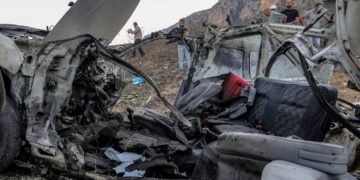It’s normally a moment of pure joy for the Rev. Khader Khalilia: the excitement, the giggles, the kisses, as his young daughters — in their Christmas pajamas — open their gifts. But this year, just the thought of it fills Khalilia with guilt.
“I’m struggling,” said the Palestinian American pastor of Redeemer-St. John’s Lutheran Church in New York. “How can I do it while the Palestinian children are suffering, have no shelter or a place to lay their heads?”
Thousands of miles away, near Jesus’ biblical birthplace of Bethlehem, Suzan Sahori has been working with artisans to bring olive wood Christmas ornaments into homes in Australia, Europe and North America. But Sahori is in no mood for festivities: “We’re broken, looking at all these children, all this killing.”
In a traditional season of merriment, many Palestinian Christians — in Bethlehem and beyond — are gripped with helplessness, pain and worry amid the Israel-Hamas war. Some are mourning, lobbying for the war to end, scrambling to get relatives to safety or seeking comfort in the Christmas message of hope.
In the occupied West Bank, Sahori, executive director of Bethlehem Fair Trade Artisans, an organization selling crafts, will pray for peace and justice. She’s grateful she’s safe — but wonders if that could change. She’s also angry.
“The joy in my heart is stolen,” she said. “I’m saying, ‘God, how are you allowing all these children to die?’ … I’m mad at God; I hope He forgives me.”
In better times, she finds the Christmas spirit in the Bethlehem area unmatched: It’s in songs cascading into streets bedecked with lights, markets displaying decorations, and the enthusiasm of children, families and tourists snapping photos with towering Christmas trees.
Now, it’s all quieter, somber. Tree lighting ceremonies she attended last year have been scrapped.
The heads of churches in Jerusalem have urged congregations to forgo “any unnecessarily festive activities.” They encouraged priests and the faithful to focus on Christmas’ spiritual meaning and called for “fervent prayers for a just and lasting peace for our beloved Holy Land.”
Thousands of Palestinians have been killed in Israel’s ongoing offensive in Gaza, launched after Hamas’ Oct. 7 killings and hostage-taking in Israel.
Days before Christmas, the Latin Patriarchate of Jerusalem said two Christian women at a church compound in Gaza were killed by Israeli sniper fire. The Israeli military said troops were targeting Hamas militants in the area; it said it was investigating the incident and takes such reports very seriously.
Khalilia is striving to comfort the distraught amid his distress.
“It’s hard to watch. It’s hard to do your job,” he said. “People are looking for us to walk with them in their suffering.”
He worries about family in the West Bank; a brother lost his income working for a hotel as travel cancellations pummeled tourism.
Khalilia, who’s from a town near Bethlehem, said his daughters will likely get fewer presents, with the savings going toward helping children in Gaza.
Many in the U.S., he said, don’t realize that Palestinian Christians exist — some ask if he converted from Islam or Judaism.
He tells them, “When you sing ‘O Little Town of Bethlehem’ on Christmas Eve, remember that Jesus was born in my hometown.”
There are 50,000 Christian Palestinians estimated to reside in the West Bank and Jerusalem, according to the U.S. State Department’s international religious freedom report for 2022. Approximately 1,300 Christians lived in Gaza, it said. Some Christians are also citizens of Israel. Many Palestinian Christians live in diaspora communities.
Susan Muaddi Darraj, a novelist in Baltimore, said Christians embody a diversity of Palestinians that gets erased. “Our existence … defies the stereotypes that are being used to dehumanize us.”
This Christmas, family gatherings have become more important for comfort, she said.


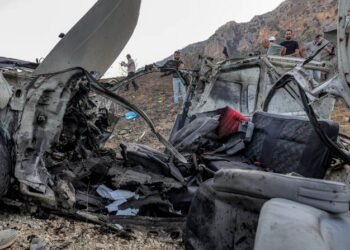



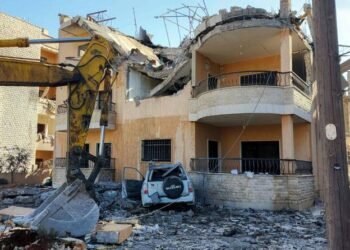
 United Arab Emirates Dirham Exchange Rate
United Arab Emirates Dirham Exchange Rate